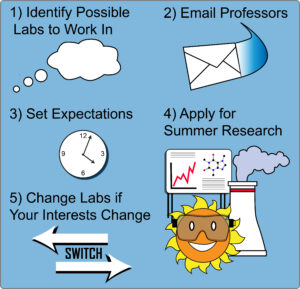Home /
Undergraduate Research
What is undergraduate research?
- Undergraduate research can take many forms. These opportunities usually involve an independent research project, where you are supervised by a mentor.
- At large institutions, a post-doc or graduate student(s) will often serve as your mentor.
- At smaller institutions, the student may work with a professor directly.
- Some students work in one lab during the entirety of their undergraduate career, whereas others may switch labs as their research interests evolve.
- These positions can be paid, for course credit, or unpaid.
- Projects and time commitments vary and should be discussed with the advisor before committing!
What opportunities are there for undergraduate research?
- Opportunities vary based on your institution:
- Large research universities have more facilities and research-active faculty, thereby generally increasing the number of undergraduate research opportunities. In these scenarios, students are usually mentored by a graduate student or post-doc in the lab, rather than the professor themselves.
- Primarily undergraduate institutions may or may not have professors doing research. Undergraduate researchers are more likely to work directly with a professor or have research opportunities in lab classes at these institutions.
- Summer Internships are often paid. These can take place at large research institutions, national labs, through your home institution or at chemical companies (see Research Experience for Undergraduates and Internships)
When should I start undergraduate research?
- Start as soon as you are interested in science! Doing research is the best way to discover if a research-intensive career is a good fit for you and it allows you to engage more deeply with topics that traditional coursework only touches upon. It is also a great way to discover what interests you the most in chemistry. Note: some professors may require the completion of certain coursework prior to entry into their research group. Reach out to specific professors to learn more.
How do I get started with undergraduate research?
- Identify potential labs to work in. If you attend a university with on-going academic research, look on the department
 website or the Office of Undergraduate Research (if applicable) to learn more about the type of research each faculty is conducting. Each research-active professor likely has a personal website detailing their research group’s interests and goals. These websites will include general research themes, group members, and recent publications. It is normal to not understand everything a lab is doing or to feel overwhelmed by jargon, but push through and find a few labs that seem interesting to you!
website or the Office of Undergraduate Research (if applicable) to learn more about the type of research each faculty is conducting. Each research-active professor likely has a personal website detailing their research group’s interests and goals. These websites will include general research themes, group members, and recent publications. It is normal to not understand everything a lab is doing or to feel overwhelmed by jargon, but push through and find a few labs that seem interesting to you!
- Email professors at your institution. Really, just email them. A lot of professors are happy to take on undergraduates, but they don’t actively recruit. Email the professor and introduce yourself, tell them your academic year, major, and chemistry/research interests; then, pivot and tell them what interested you about their research. Ask them if they have space to take on an undergraduate and if they’d be willing to meet with you to talk more about the science and potential projects.
- Set expectations. When you do get to meet with professors, talk about which projects they have funding for and what hours/expectations they have for you. Often times, you will need at least 2-3 days with an open block of time (i.e. 3-5 hours) to set-up, conduct, and clean-up after experiments. Therefore, you may have to plan your schedule to keep a couple of afternoons or mornings free for undergraduate research.
- Apply to Research Programs over the Summer. This is a great option for students from schools without an active research program. The U.S. government funds programs like Research Experience for Undergraduates (REUs) which provide paid research internships and your department may also have funding to pay students for summer research. Government- or industry-based internships are also great opportunities to pursue (see Internships).
- Change labs if your Research Interests Evolve or if the Lab Isn’t a Good Fit. Your research interests may change during undergrad as you take more classes and are exposed to new ideas. Don’t be afraid to talk about this with your research advisor and switch labs or apply to graduate programs in totally different facets of chemistry. This is normal and no one expects undergrads to have their lives and careers completely figured out.
Resources:
 website or the Office of Undergraduate Research (if applicable) to learn more about the type of research each faculty is conducting. Each research-active professor likely has a personal website detailing their research group’s interests and goals. These websites will include general research themes, group members, and recent publications. It is normal to not understand everything a lab is doing or to feel overwhelmed by jargon, but push through and find a few labs that seem interesting to you!
website or the Office of Undergraduate Research (if applicable) to learn more about the type of research each faculty is conducting. Each research-active professor likely has a personal website detailing their research group’s interests and goals. These websites will include general research themes, group members, and recent publications. It is normal to not understand everything a lab is doing or to feel overwhelmed by jargon, but push through and find a few labs that seem interesting to you!